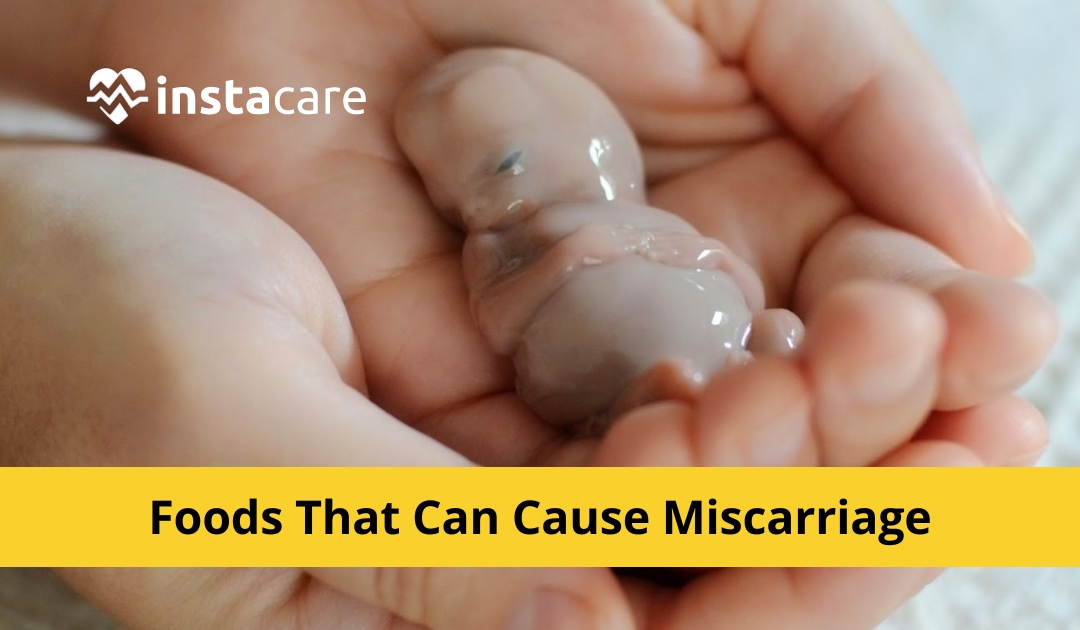When you’re pregnant, it’s important to be aware of the foods that you are consuming. There are some certain kinds of food that can have a negative impact on your pregnancy and even cause a miscarriage. Being informed about potential risk factors for premature termination of pregnancy is an essential part of having a healthy baby — yet, many women don't know which foods are potentially dangerous during pregnancy. In this blog post, we will cover 15 foods that can cause miscarriage and what steps to take if they are consumed in early pregnancies. With the right information, you will be able to make decisions to ensure both your health and well-being throughout the course of your pregnancy journey.
Foods that can cause miscarriage
1- Unpasteurized milk
Although unpasteurized milk is often thought of as a healthier alternative to pasteurized milk, it is important to recognize that this beverage can be very dangerous for pregnant women. Unpasteurized milk is one of the few foods that are known to cause miscarriages due to its inherent risk of containing a variety of infectious bacteria. There are alternatives to unpasteurized milk such as pasteurization, which kills off any potential harmful organisms and makes the milk much safer to consume. Making sure any dairy products are properly pasteurized should always be a priority for expectant mothers who want to make sure their baby stays healthy and strong.
2- Soft cheeses
Soft cheeses can be a delicious addition to any meal, but it's important to know the safety guidelines. Many types of soft cheese such as brie and camembert are made using unpasteurised milk and should be avoided during pregnancy since they can contain listeria, a type of food poisoning that can cause miscarriage. Make sure any soft cheese is either made with pasteurized milk or clearly labelled 'suitable for pregnant women' before eating.
3- Raw eggs
Raw eggs are one of the Foods that can cause miscarriage, due to the presence of salmonella bacteria. While salmonella can cause fever, abdominal cramps and diarrhea in healthy adults, these symptoms can be exacerbated when they occur during pregnancy. Symptoms are usually seen within eight to 72 hours of eating raw eggs or contaminated products containing them.
Foods to avoid generally include any dish made with raw or undercooked eggs such as Caesar dressing or mayonnaise. Additionally, it's important to check food labeling properly as some pre-made sauces and desserts may contain remnants of raw egg. When in doubt, cook the egg until it is hard-boiled or fried; this is the safest way to prevent any potential health problems if consumed by pregnant women.
View More: 10 Best Exercises for Normal Delivery
4- Undercooked meats
Eating undercooked meats poses a serious risk to pregnant women, as they are highly prone to food-borne illnesses that can potentially cause a miscarriage. Foods like undercooked poultry, pork, hamburgers, and eggs may contain bacteria or parasites that can make someone sick. Pregnant women especially should take extra caution when consuming meats that haven't been properly cooked.
It is best practice for pregnant women to only eat meats that are cooked until there is no pink remaining in the center. For added protection it's also important to clean cooking utensils consistently and avoid sharing them with other raw foods. By taking the proper precautions and ensuring your meat is fully cooked before consumption, you can significantly reduce your risk of acquiring a food-borne illness - keeping both you and your unborn baby safe!
5- Processed meats
Processed meats are considered to be some of the unhealthiest and most dangerous items commonly found in the average person's diet. Foods like hot dogs, bologna, salami, etc contain high levels of added preservatives like nitrates or nitrites that can cause serious health problems and even contribute to an increased risk of miscarriage for pregnant women.
Foods like bacon and other cured pork products have similar hazards - they contain high amounts of sodium which should be limited during pregnancy as too much can lead to unintended consequences such as pre-term birth or stillbirth. It's important to consider a more balanced menu if you are expecting to ensure both you and your baby stay healthy.
6- Caffeine
Caffeine is a stimulant found in coffee, tea, chocolate and some soft drinks. It is estimated that up to 90 percent of adults worldwide consume the drug daily. While caffeine has been enjoyed for centuries and used to increase alertness and concentration, it can have negative side effects depending on the level of consumption. Caffeine increases your body's level of stress hormones like cortisol and adrenaline; high doses of caffeine may pose an increased risk of potential harm including headache, irritability, anxiety, regular sleeplessness and even miscarriage as it can be detected in different foods like energy drinks, chocolate bars and coffee products.
Due to its well-known effects such as difficulty sleeping or nervous energy, women who are pregnant should strive to limit their intake or avoid caffeine altogether as current science suggests that consuming more than 200 mg per day could lead to an increased risk of miscarriage.
7- Raw meat
Raw meat can be dangerous for pregnant women, as it can contain harmful bacteria such as listeria that may trigger a miscarriage. In addition to raw meat, there are other foods expecting mothers should avoid due to the high risk of possible foodborne illnesses and complications. Foods on this list can include unpasteurized milk or juice, soft cheeses, raw or undercooked eggs or fish, deli meats, and refrigerated pâtés or meat spreads. Taking precautions to avoid these foods during pregnancy is essential for keeping mother and baby safe and healthy.
8- Alcohol
Alcohol consumption is a serious health concern, especially for pregnant women or those who are planning to become pregnant. While light consumption of alcohol may not be harmful for some people, for women expecting a baby, even small amounts of alcohol decreases birth weight and can potentially cause miscarriage.
Foods such as olives and pickles, Energy drinks containing caffeine, food containing artificial sweeteners should all be avoided during pregnancy as these can also increase the risk of miscarriage. It is important to remember that there is no safe amount of alcohol during pregnancy and thus it is recommended by healthcare professionals that pregnant women should simply avoid it altogether.
9- Papaya
Papaya is an incredibly versatile tropical fruit that is beloved all around the world. Rich in nutrients, it adds a subtle sweetness to salads, smoothies, main dishes like tacos and poke bowls, desserts, and more. However, pregnant women should be mindful if eating papaya since this delicious fruit has been linked to miscarriage. Eating unripe papaya can release the plant hormone known as latex, which can contract the female uterus and cause a miscarriage or pre-term labor.
For this reason, medical professionals recommend avoiding raw papaya when pregnant as part of Foods That Can Cause Miscarriage. It is also important for expecting mothers to discuss their dietary options with medical professionals as possible alternatives exist; ripe papaya, for instance, contains fewer levels of latex and therefore does not present the same risk of complications.
View More: Miscarriage Signs And Symptoms
10-Aloe Vera
Aloe vera is more commonly known for its topical uses—from skin care benefits to treating minor burns and cuts—but the plant can also be consumed as part of a nutritious diet. While the juice of the aloe vera plant is used in many health and beauty products, it’s important to remember that ingesting some foods can cause miscarriage. Foods containing aloe vera, such as aloe vera juice or supplements, should only be ingested with careful caution and under the direction of a doctor.
Aloe vera juice contains natural laxatives, so pregnant women should also avoid consuming beverages made with this plant in order to reduce their risk of experiencing miscarriage or birth defects caused by consuming large amounts of laxatives. As with any dietary supplement during pregnancy, using aloe vera is not without risks and should always be discussed with a physician before adding it to one’s diet.
11-Animal Liver
The liver is an essential organ for humans and animals alike, responsible for filtering toxins and waste from the body. However, did you know that consuming liver from certain animals can be harmful to pregnant women? There are certain foods that can cause miscarriage, and liver from animals such as cows and lambs is amongst them. This is due to the high levels of vitamin A present in the liver, which in excess can harm the developing fetus. It's crucial for expectant mothers to be mindful of their intake of animal liver and consult with their healthcare provider for advice on how to safely consume this nutrient-dense food.
12-Pineapple
Pineapple has been long known as a delicious tropical fruit that can be enjoyed in a variety of ways, but did you know that it has also been a topic of conversation among expecting mothers? Some diets advise pregnant women to avoid pineapple as it is believed to have properties that may cause miscarriage. However, it's important to note that this claim has not been scientifically proven and many doctors say that moderate consumption of pineapple is safe during pregnancy. So feel free to indulge in this sweet and juicy fruit, just be mindful of how much you're eating and always consult with your healthcare provider.
13-Sprouted Potatoes
Did you know that sprouted potatoes can be harmful to pregnant women? That's right, consuming sprouted potatoes can increase the risk of miscarriage due to the presence of solanine, a toxic compound found in the potato's skin. Solanine can also cause other adverse effects such as vomiting, diarrhea, and headaches. It is essential to always check your potatoes for any sprouts before consuming them, especially if you are pregnant. If you do find sprouts, peel the potato well to remove any traces of solanine before cooking. It's better to be safe than sorry!
14-Mercury-rich Fish
Mercury is a toxic element that can cause serious health problems, and unfortunately, some types of fish are known to be high in this harmful substance. Certain species of fish, such as swordfish and tuna, are notorious for containing high levels of mercury, which can be dangerous for pregnant women. It's been suggested that consuming meat from these fish may even cause miscarriages. This is a scary thought, but it's important to be aware of the risks and to carefully choose the types and amounts of fish we consume. There are still plenty of safe and healthy options out there for seafood lovers, as long as we do our research and stay informed.
15-Spices
While spices are an essential ingredient in many culinary dishes,
it's important to be aware of their potential effects on our health. In
particular, pregnant women need to take extra care when incorporating certain
spices into their meals as some have been known to cause miscarriage. Among
these are black pepper, paprika, and cumin. However, it's important to note
that these spices are only harmful in large doses, so there's no need to avoid
them altogether. As with all things in life, moderation is key. So, next time
you're cooking up a storm in the kitchen, remember to use spices sparingly and
enjoy your meal with peace of mind.
Foods to avoid in Pregnancy
When pregnant, it is essential to maintain a healthy and varied diet that meets your nutritional needs. This includes avoiding certain foods due to them carrying a higher risk of food-borne illnesses or containing unsafe chemicals. These foods include high mercury fish such as marlin, swordfish, and tuna; raw shellfish such as oysters, clams and mussels; unpasteurized soft cheeses including brie and camembert; saturated fats from processed meats; alcohol; artificial sweeteners like saccharin and aspartame; deli meats that have not been reheated before serving; undercooked or raw eggs; caffeine in large amounts (usually 3 cups or more); unpasteurized juice or cider; heavyweight smoked seafood such as salmon, trout, whitefish and lox. Following these simple steps can help ensure the safest possible pregnancy for you and your baby.
Common Causes of Miscarriage
Losing a pregnancy can be extremely traumatic and difficult to cope with. One of the most common causes of miscarriage is chromosomal abnormality, which occurs when the baby doesn't develop normally due to an abnormal number of chromosomes in its cells. Other issues such as incorrect implantation, infections, pelvic/uterine abnormalities, and hormone problems can also play a role.
Some medical experts believe that women over 35 have higher rates of miscarriages due to their ages increasing the likelihood of having a fetus with chromosomal issues; however, it's important to note that most pregnancies in this age bracket do not end in miscarriage. It is recommended for any woman who has had multiple miscarriages to seek further testing from their healthcare provider in order to uncover any potential underlying causes for miscarriages occurring more than once.
Foods That Can Induce Miscarriage
It is important to be aware of any foods that can increase pregnant women’s risk of miscarriage. An array of foods has been linked to a higher risk of miscarriage, such as fish with high levels of mercury; undercooked or raw meat, poultry, eggs and seafood; certain soft cheeses contaminated with bacteria; unpasteurized juices and ciders; and unwashed fruits and vegetables. Pregnant women should also be concerned about the amount of caffeine intake throughout the duration of their pregnancy - more than one cup per day may increase the risk for a miscarriage.
Fortunately, there are many options for healthy eating during pregnancy, such as eating plenty of nuts and seeds, opting for whole grain products instead of refined grains, including a variety of colorful vegetables into meals and snacks, and snacking on natural low-fat yogurt or kefir. Eating a balanced diet without consuming food items known to induce miscarriages can help pregnant women have a full-term pregnancy.
Please book an appointment with the best Gynecologist in Lahore, Karachi, Islamabad, and all major cities of Pakistan through InstaCare, or call our helpline at 02137136090 to find the verified doctor for your disease.
Source: https://instacare.pk/blog/foods-that-cause-miscarriage












